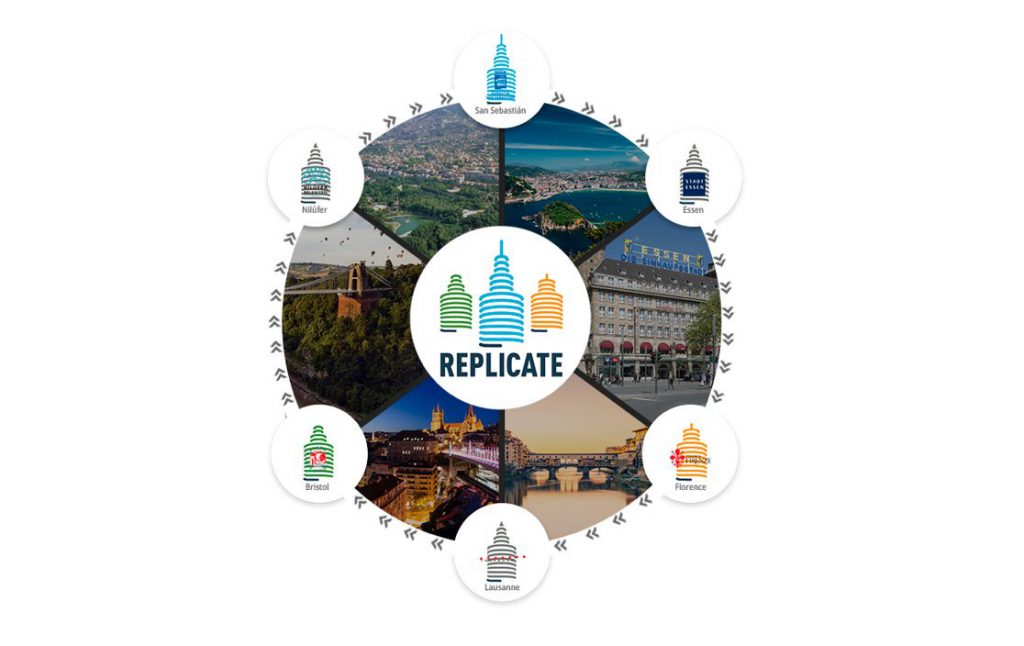The City-to-City-Learning Programme comes to a successful end after six sequential and gradually accumulated sessions led by each REPLICATE city
City-to-City-Learning Programme is the core replication strategy and its preparation kicked-off at the early beginning of Replicate project in 2016. The programme has been led by the University of Oxford and has come to an end. Furthermore, the turnout of the programme could be sum up as follows: more than 150 registered participants and almost 300 offline views.
Regarding the objective of this program, it aimed at fostering dialogue between the six cities by directly connecting their stakeholders. The programme lasted during 2019 being participated and led by the three lighthouse cities (San Sebastian, Florence and Bristol) alongside three fellow cities (Essen, Nilüfer and Lausanne).
Particularly, the programme took place during 2019 starting on February and ending up on November:
• 1st SESSION (Leading city of San Sebastián) 5th of February – Excellence of service provision based on data monitoring and smart management:
Slot 1: From traditional infrastructures to intelligent connected solutions – (Leycolan)
Slot 2: Exploitation of city information linking data to other cities through the semantic web – (Eurohelp)
Slot 3: Smart Services through a Smart Platform – (Ikusi)
• 2nd SESSION (Fellow city of Essen) 21th March – The new smelters of the coal heartland
Slot 1: How Facilitation of the Start-Up Scene can help to Blend the Smart and Sustainable Agenda of Cities: The Case of Camp-Essen – (Camp-Essen)
Slot 2: Impacthub Ruhr: Connecting Communities for Change – (Impacthub Ruhr)
Slot 3: Essen 51. How a brownfield turns into a showcase for the smart and sustainable future of cities – (Thelen-Gruppe)
• 3rd SESSION (Leading city of Florence) 7th May – Go fast, go green, get connected: that’s smart!
Slot 1: Fast recharge (and e-taxi): an example of the e-mobility initiatives to deploy sustainable mobility in the city (lead by municipality and e-distribuzione) – (Comune di Firenze and e-distribuzione)
Slot 2: E-recharge system to move towards a sustainable community and city – (Comune di Firenze)
Slot 3: Smart City Platform – (Comune di Firenze)
• 4th SESSION (Fellow city of Lausanne) 9th July – Roadmap for the realization of an eco-district, including development of medium-depth geothermal energy in urban areas
Slot 1: Roadmap for the realization of an eco-district – (Ville de Lausanne)
Slot 2: Development of medium-depth geothermal energy in urban areas – (Ville de Lausanne)
Slot 3: Energy efficiency program – (Ville de Lausanne)
• 5th SESSION (Leading city of Bristol) 26th September – Collaborating with Communities: Creating the future cities we need
Slot 1: Methodologies and Approaches to Co-design – (Knowle West Media Centre & University of Bristol)
Slot 2: Technology, data and democracy – how we make it accessible – (University of Bristol & Knowle West Media Centre)
Slot 3: One city approach and inclusive futures – (University of Bristol & Bristol Energy Network-Civic Society)
• 6th SESSION (Fellow city of Nilufer) 20th November – Socio-economic development from below
Slot 1: Grassroots Empowerment (Nilüfer Municipality)
Slot 2: Bottom-up Energy Efficiency (Nilüfer Innovation Center)
Slot 3: Industrial spin-off Ecologies (Nilüfer Municipality)
All these webinar sessions can be found on the website of the REPLICATE Project for anyone who wants to view them. All sessions touched upon the three strategic sectors of smart cities: energy, mobility and ICT.
According to the WP Leader, Dr. Igor Calzada (www.igorcalzada.com), from the University of Oxford, “this experimental approach has resulted in a productive multidirectional conversational loop among stakeholders within the six cities”. Thus, the City-to-City-Learning Programme has tried to put all cities at the same level to fostering a multidirectional learning process.
Lastly, remember that you can find all the content from the programme at www.replicate-project.eu/city2citylearning Please, feel free to share your thoughts and comments using #City2CityLearning and #ReplicateEU on Twitter.



